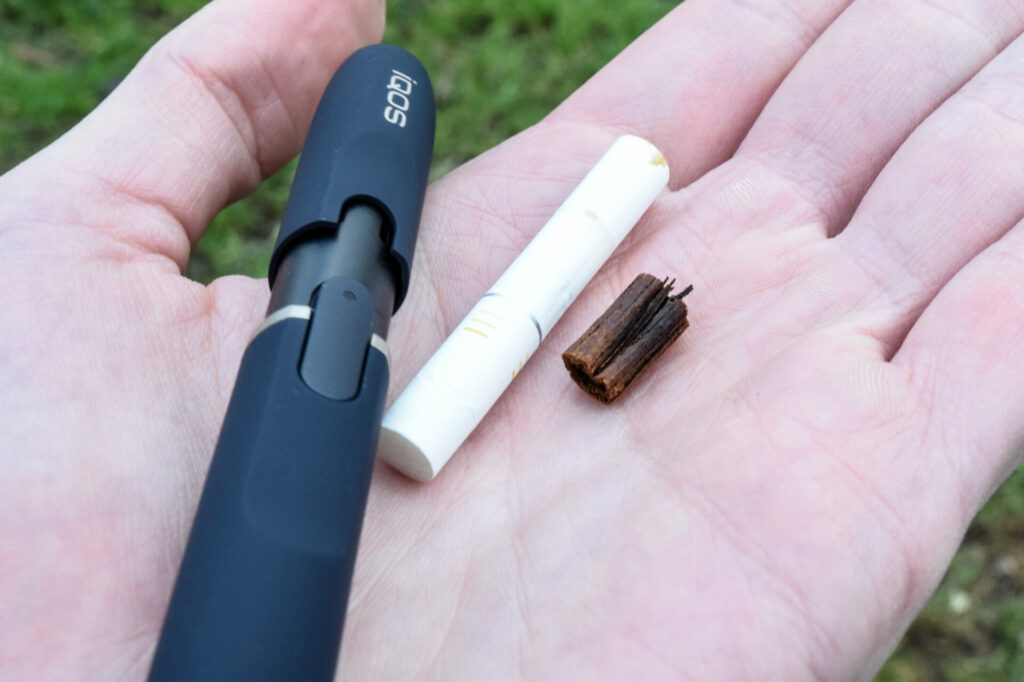Attempts by the tobacco giant Philip Morris to put its heated-tobacco product IQOS on Belgian store shelves have come up against stiff opposition over health and legislative concerns, Belgian newspaper Het Laatste Nieuws writes.
Heated-tobacco products do not directly burn the tobacco, instead creating a water and glycerine-based vapour that can be inhaled. The company claims that “It is therefore much less risky for health. People often think that nicotine is the big culprit, but it’s not. 95% of the toxicity comes from the smoke… we take that away,” said Miguel Matos, CEO of Philip Morris for Benelux.
The products are advertised as a safer alternative to smoking, though this claim is disputed. Philip Morris advertises the products as a replacement for cigarettes, stating that 71% who use IQOS abandon normal cigarettes altogether.
While the heated tobacco products sound good on paper, in reality, there are still some serious health concerns. Though IQOS may have lower levels of some carcinogens, other harmful chemicals which are not found in cigarettes are still delivered to the user. While the contents of traditional cigarettes are well known, IQOS is a novel product and the long-term health effects cannot yet be assessed.
Philip Morris wants to keep pushing IQOS products, aiming to generate around half of its revenue from smokeless consumption by 2025. The company’s cigarette brands, such as Marlboro, L&M, and Chesterfield will eventually stop offering traditional cigarettes in stores.
Tobacco alternative or public health risk?
The plans have been resisted by the Belgian government, which is still unconvinced by the benefits of these “smokeless” products. IQOS products are available in 71 markets globally – Belgium is not one of them. FPS Public Health wants to force Philip Morris to put warnings on the cartridge packs, as with traditional cigarettes.
“Public health wants us to put the same warning on our packs, while they are fundamentally different products. We are not allowed to offer an explanation to smokers who want to switch,” Matos complained.
According to public health institute Sciensano, as of 2018, around 19% of Belgians smoke. 15% are daily smokers, while 4% are occasional smokers. There has been a massive reduction in the number of smokers over the last 20 years. In 1997, around 25.5% of all Belgians were smokers.
Tackling tobacco entirely
Belgium has clamped down considerably on smoking, implementing bans on tobacco advertising, placing warnings on packs, imposing new “plain packaging” requirements, and raising taxes on cigarette sales.
The government aims to reduce the level of smoking within the country by another 10% in the next few years, but initial data suggests that this target will not be achieved. Critics argue that smokeless tobacco products could be a good way to meet this goal, yet the government maintains its position that all tobacco use is harmful and should be reduced.
Related News
- Lung cancer: Both the most preventable and most deadly in Belgium
- New Zealand bans tobacco sales for everyone born after 2009
The government is insisting on legislation that would classify IQOS in the same way as normal tobacco products, a decision that Philip Morris has appealed before the Council of State. No decision has yet been made on whether IQOS products will appear on Belgian shelves.
Many Belgian consumers already use the product, buying large quantities of the tobacco sticks and the devices in other markets, such as in France, Germany, the Netherlands, or in duty-free areas of international airports.

